I am not a dude. Just in case anyone still had lingering doubts in that vicinity. I am not a dude, and I will be totally honest about how very little I understand dude dynamics. For all that I have a fair number of male friends, I know them by and large through my relationship with their female spouses or girlfriends or mutual friends. I know very few guys without a female lens. Not because I hate men or I think they're bad friends or anything, it's just how that all turned out.
So when I watch a show like Bob's Burgers, that is totally an ensemble show, but one that focuses rather clearly on issues of masculine performance and of what it means to be a man in modern society, well, I notice.
I mean, I know there are other shows that do this too, like Last Man Standing or Undateable or Workaholics, but I don't actually like those shows. And, for my bit, the masculinity they portray on those shows seems so forced. So painful. Like the writers themselves aren't sure what masculinity is and why we should be talking about it.
Which is why, ultimately, I like Bob's Burgers so much. (Also because it's very funny). For my money, this is a show that addresses masculinity deeply and well, with humor and love, and it gets right at the real problem most people have with masculinity narratives: we don't know exactly what masculinity is supposed to be.
If femininity is socially constructed to be narrow and specific, a barrier to all but the most pretty and popular, and something that you're supposed to instinctively know and appreciate, then masculinity is a flip side of that. You're still supposed to intrinsically know what it is and how to be it, but in contrast to femininity (where there are too few too specific ideas of what it is), masculinity is nebulous and vague. At least I think it is.
Horseback riding is masculine, right? Only horses are associate with teenage girls, obsession-wise, and most images we conjure up of people horseback riding are relatively generic. Fireworks are manly, right? Except fireworks are literally just bright shiny sparkles in the sky in pretty colors. Sometimes they make shapes.
Bacon is manly. But, why? It's a food. Arguably a breakfast food, and isn't cooking a stereotypically feminine thing to do? Trucks. Camping. Car repair. Guns. All of these are things that sound manly but don't really make sense when you look at them for too long. What then is masculinity?
I don't know. That's why I was asking you.
The reason I'm talking about this in the context of Bob's Burgers is because the show isn't claiming to know what masculinity is or is not. But that's the point. It's not claiming to know. Instead, the show addresses the confusion, and allows this to be an open conversation. Is Bob Belcher masculine? From what I can tell, the show is basically saying, "He is if you want him to be. But you're going to have to be the one to make that call." I respect that.
Bob Belcher (voiced by H. Jon Benjamin) is a husband, father of three, and owner of a mediocre diner in a seaside town. He loves cheeseburgers (hence why he makes them for a living), takes pride in his physical appearance and Tom Selleck mustache, and thinks of himself as the kind of guy who can teach his children how to fight (he's wrong about that last part). He hates his mother-in-law, his best friends are blue-collar workers, and he's extremely capable under the hood of a car or around the house. Pretty manly, right?
However. Bob is also surprisingly comfortable with his feelings and dealing with the feelings of the people around him. While he's a little gruff, he does care deeply for his family, and goes out of his way to talk about emotional issues and keep the peace. When his son is terrible at baseball, Bob tells him it's okay if he quits. When that same son decides he wants to do competitive table-setting, Bob doesn't just show up (he puts up a fuss not because it's girly, but because it sounds so boring), but he actually gets really into it and helps his son create a terrifying menstruation themed place-setting.
When his teenage daughter decides that her life will be best completed if she gets to take capoiera classes, Bob objects not because he thinks she shouldn't learn to fight, but because he thinks the class is a scam. And when her instructor fails her and won't progress her to the next level, Bob fights the guy. Bob fights him and, this is the most important part in my view, he loses. Repeatedly. Publicly.
Is that masculine? I mean, on the one hand, he is a man, who has a mustache and a lot of body hair and runs a diner. He likes sports (sort of) and watches old Westerns and has a running grudge match against Jimmy Pesto, who runs the Italian place across the street. On the other hand, Bob once got so emotionally attached to a cow (technically a steer) in a wig that he moved it into the apartment so it wouldn't be cold.
He was the one who talked his in-laws through their emotional problems and saved their marriage as well as their placement in their retirement community. He coached the kids' synchronized swimming team, even though he hates synchronized swimming and is terrible at it. He fake robbed his own restaurant so that he could make his wife's dreams come true. He spent hundreds of dollars and hours of time tracking down a special gift for his wife for their anniversary, even going so far as to beg his sworn enemy for help.
Heck, Bob Belcher is the guy who walked his teenage daughter down the street to get her first leg waxing, and then agreed to get his legs waxed alongside her so she wouldn't be scared. They held hands.
I guess what I'm saying is that Bob Belcher is a masculine character, but he's a complicated one. And that is, for my money, totally and completely awesome. I want more characters like Bob on television, just like I want more characters like Linda. I want representation of more men who are open with their feelings, invested in the emotional state of others, and who in no way think that being emotionally sensitive makes them less manly.
Even more than his own presentation of non-normative (insofar as there is a norm) masculinity, though, what I love is how Bob treats the men around him, and how the show presents them. Gene Belcher (Eugene Mirman) is a freaking strange kid, but Bob never makes him feel bad about himself.
Nor does Bob ever really try to impose a form of idealized masculinity on Gene. When Gene dresses as Queen Latifah for Halloween, Bob isn't mad his son has dressed as a woman, he's confused because he doesn't get the reference at first. When he finds the kids have rigged up an illegal casino in the basement, Bob literally makes no comment on finding his son in a sparkly dress and full-length gloves.
None of the male characters on the show are particularly normative, not really. Teddy is a blue collar worker, but he's also arguably Bob's best friend, and the kind of guy who cherishes and mourns his guinea pig when she passes. Jimmy Junior is presented as Tina's (the teenage daughter) dream guy. Not because he's such a jock, but because he's sensitive and he dances like an angel and he has a really cute butt.
Mort from next door is a mortician but also a surprisingly cultured guy. Who happens to be really obsessed with dead people. Even Hugo, the loathed health inspector, is notable for the complexity of his character. He might hate Bob, but he loves his job and the rules it espouses.
Mr. Frond is a dingbat, but that only makes him more interesting. And digesting the mildly terrifying dynamics behind Andy and Ollie would take too long. Much longer than we have here.
The show also takes the time to tackle and disabuse conventional notions of manliness. Like when their dentist, Dr. Yap tries to get his life advice from pickup artists, the show offers a critique of the pickup artist movement, voiced by Bob. Or when Bob and Jimmy Pesto fight and the show makes a point about how all this does is ruin both of their business.
My point is this: there is no one way to be a man. Just like inaccurate media representations of female characters can be damaging to women, it matters that men get solid and complex representation in the media. It matters that we show a guy who really and truly loves his family, and shows it by talking about his feelings, and it matters that he's also hyper-competitive and kind of a goober and prone to fits of nostalgia. It all matters, because Bob is a great character. He has flaws and he's complicated and it's all great.
So, no, I wouldn't say I really understand masculinity. But if real masculinity is anything like Bob Belcher, then I think I'm a fan.
So when I watch a show like Bob's Burgers, that is totally an ensemble show, but one that focuses rather clearly on issues of masculine performance and of what it means to be a man in modern society, well, I notice.
I mean, I know there are other shows that do this too, like Last Man Standing or Undateable or Workaholics, but I don't actually like those shows. And, for my bit, the masculinity they portray on those shows seems so forced. So painful. Like the writers themselves aren't sure what masculinity is and why we should be talking about it.
Which is why, ultimately, I like Bob's Burgers so much. (Also because it's very funny). For my money, this is a show that addresses masculinity deeply and well, with humor and love, and it gets right at the real problem most people have with masculinity narratives: we don't know exactly what masculinity is supposed to be.
If femininity is socially constructed to be narrow and specific, a barrier to all but the most pretty and popular, and something that you're supposed to instinctively know and appreciate, then masculinity is a flip side of that. You're still supposed to intrinsically know what it is and how to be it, but in contrast to femininity (where there are too few too specific ideas of what it is), masculinity is nebulous and vague. At least I think it is.
Horseback riding is masculine, right? Only horses are associate with teenage girls, obsession-wise, and most images we conjure up of people horseback riding are relatively generic. Fireworks are manly, right? Except fireworks are literally just bright shiny sparkles in the sky in pretty colors. Sometimes they make shapes.
Bacon is manly. But, why? It's a food. Arguably a breakfast food, and isn't cooking a stereotypically feminine thing to do? Trucks. Camping. Car repair. Guns. All of these are things that sound manly but don't really make sense when you look at them for too long. What then is masculinity?
I don't know. That's why I was asking you.
The reason I'm talking about this in the context of Bob's Burgers is because the show isn't claiming to know what masculinity is or is not. But that's the point. It's not claiming to know. Instead, the show addresses the confusion, and allows this to be an open conversation. Is Bob Belcher masculine? From what I can tell, the show is basically saying, "He is if you want him to be. But you're going to have to be the one to make that call." I respect that.
Bob Belcher (voiced by H. Jon Benjamin) is a husband, father of three, and owner of a mediocre diner in a seaside town. He loves cheeseburgers (hence why he makes them for a living), takes pride in his physical appearance and Tom Selleck mustache, and thinks of himself as the kind of guy who can teach his children how to fight (he's wrong about that last part). He hates his mother-in-law, his best friends are blue-collar workers, and he's extremely capable under the hood of a car or around the house. Pretty manly, right?
However. Bob is also surprisingly comfortable with his feelings and dealing with the feelings of the people around him. While he's a little gruff, he does care deeply for his family, and goes out of his way to talk about emotional issues and keep the peace. When his son is terrible at baseball, Bob tells him it's okay if he quits. When that same son decides he wants to do competitive table-setting, Bob doesn't just show up (he puts up a fuss not because it's girly, but because it sounds so boring), but he actually gets really into it and helps his son create a terrifying menstruation themed place-setting.
When his teenage daughter decides that her life will be best completed if she gets to take capoiera classes, Bob objects not because he thinks she shouldn't learn to fight, but because he thinks the class is a scam. And when her instructor fails her and won't progress her to the next level, Bob fights the guy. Bob fights him and, this is the most important part in my view, he loses. Repeatedly. Publicly.
Is that masculine? I mean, on the one hand, he is a man, who has a mustache and a lot of body hair and runs a diner. He likes sports (sort of) and watches old Westerns and has a running grudge match against Jimmy Pesto, who runs the Italian place across the street. On the other hand, Bob once got so emotionally attached to a cow (technically a steer) in a wig that he moved it into the apartment so it wouldn't be cold.
He was the one who talked his in-laws through their emotional problems and saved their marriage as well as their placement in their retirement community. He coached the kids' synchronized swimming team, even though he hates synchronized swimming and is terrible at it. He fake robbed his own restaurant so that he could make his wife's dreams come true. He spent hundreds of dollars and hours of time tracking down a special gift for his wife for their anniversary, even going so far as to beg his sworn enemy for help.
Heck, Bob Belcher is the guy who walked his teenage daughter down the street to get her first leg waxing, and then agreed to get his legs waxed alongside her so she wouldn't be scared. They held hands.
I guess what I'm saying is that Bob Belcher is a masculine character, but he's a complicated one. And that is, for my money, totally and completely awesome. I want more characters like Bob on television, just like I want more characters like Linda. I want representation of more men who are open with their feelings, invested in the emotional state of others, and who in no way think that being emotionally sensitive makes them less manly.
Even more than his own presentation of non-normative (insofar as there is a norm) masculinity, though, what I love is how Bob treats the men around him, and how the show presents them. Gene Belcher (Eugene Mirman) is a freaking strange kid, but Bob never makes him feel bad about himself.
Nor does Bob ever really try to impose a form of idealized masculinity on Gene. When Gene dresses as Queen Latifah for Halloween, Bob isn't mad his son has dressed as a woman, he's confused because he doesn't get the reference at first. When he finds the kids have rigged up an illegal casino in the basement, Bob literally makes no comment on finding his son in a sparkly dress and full-length gloves.
None of the male characters on the show are particularly normative, not really. Teddy is a blue collar worker, but he's also arguably Bob's best friend, and the kind of guy who cherishes and mourns his guinea pig when she passes. Jimmy Junior is presented as Tina's (the teenage daughter) dream guy. Not because he's such a jock, but because he's sensitive and he dances like an angel and he has a really cute butt.
Mort from next door is a mortician but also a surprisingly cultured guy. Who happens to be really obsessed with dead people. Even Hugo, the loathed health inspector, is notable for the complexity of his character. He might hate Bob, but he loves his job and the rules it espouses.
Mr. Frond is a dingbat, but that only makes him more interesting. And digesting the mildly terrifying dynamics behind Andy and Ollie would take too long. Much longer than we have here.
The show also takes the time to tackle and disabuse conventional notions of manliness. Like when their dentist, Dr. Yap tries to get his life advice from pickup artists, the show offers a critique of the pickup artist movement, voiced by Bob. Or when Bob and Jimmy Pesto fight and the show makes a point about how all this does is ruin both of their business.
My point is this: there is no one way to be a man. Just like inaccurate media representations of female characters can be damaging to women, it matters that men get solid and complex representation in the media. It matters that we show a guy who really and truly loves his family, and shows it by talking about his feelings, and it matters that he's also hyper-competitive and kind of a goober and prone to fits of nostalgia. It all matters, because Bob is a great character. He has flaws and he's complicated and it's all great.
So, no, I wouldn't say I really understand masculinity. But if real masculinity is anything like Bob Belcher, then I think I'm a fan.

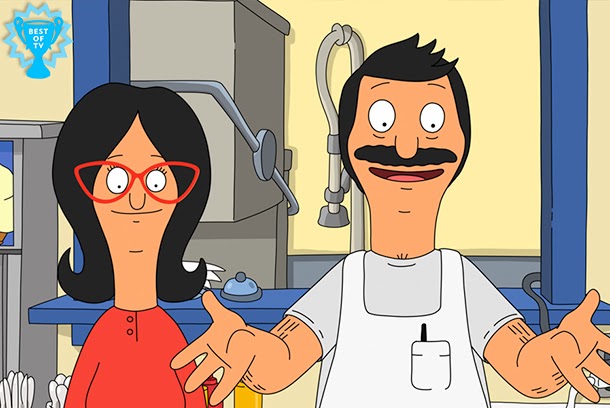
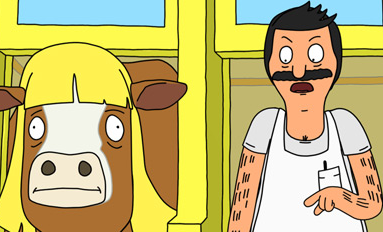

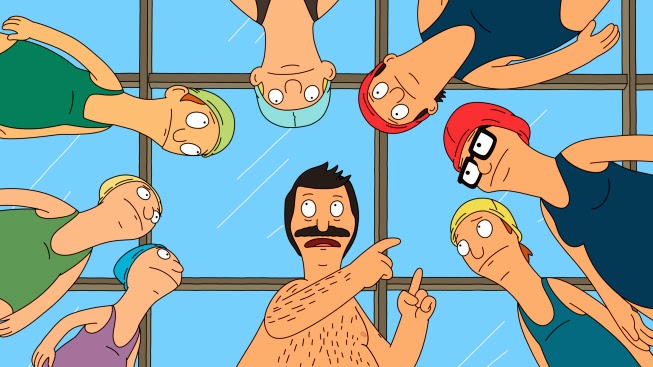
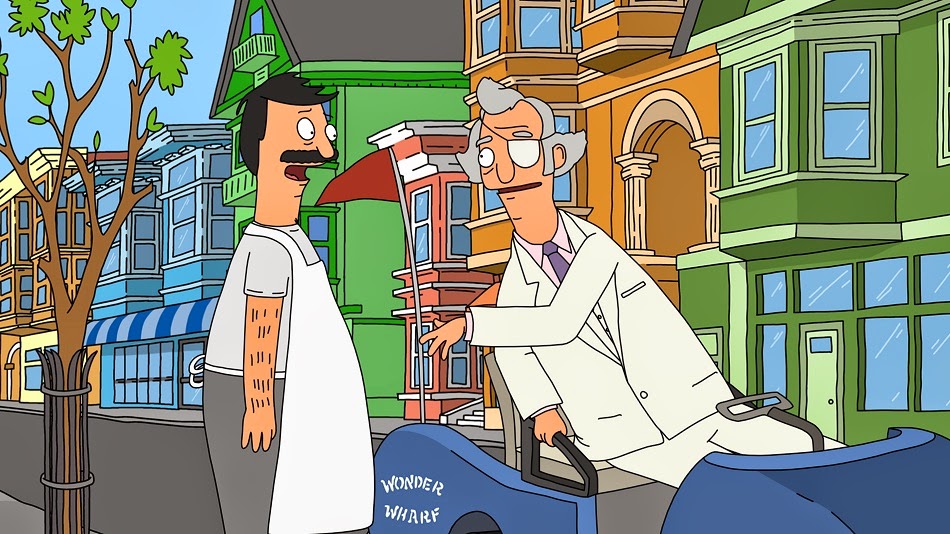
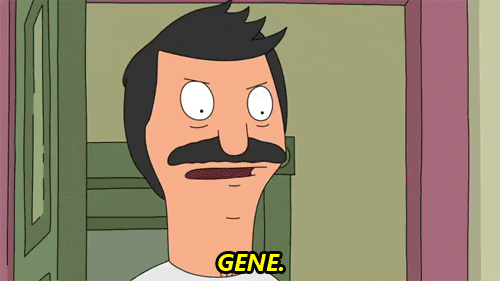
RUSSIAN ESCORTS
ReplyDeleteRUSSIAN CALL GIRL
RUSSIAN CALL GIRLS
HOUSEWIFE ESCORT
HOUSEWIFE ESCORTS
HOUSEWIFE CALL GIRLS
HOUSEWIFE CALL GIRL
MODEL ESCORT
MODEL ESCORTS
COLLEGE CALL GIRL
COLLEGE CALL GIRLS
INDEPENDENT ESCORT SERVICE
INDEPENDENT ESCORTS SERVICE
INDEPENDENT ESCORTS SERVICES
INDEPENDENT CALL GIRL
INDEPENDENT CALL GIRLS
ESCORT
ESCORTS
FEMALE ESCORTS SERVICE KOLKATA
KOLKATA FEMALE ESCORTS SERVICE
INDEPENDENT ESCORTS SERVICE
INDEPENDENT ESCOTRTS SERVIC KOLKATA
KOLKATA INDEPENDET ESCORTS SERVICE
RUSSIAN ESCORTS SERVICE KOLKATA
RUSSIAN ESCORTS SERVICE
KOLKATA RUSSIAN ESCORTS SERVICE
FOREIGN ESCORTS SERVICE IN KOLKATA
INDEPENDEN FOREIGN ESCORTS SERVICE
ESCORT FOREIGN SERVICE IN KOLKATA
SEXY FEMALE ESCORTS SERVICE
SEXY MODEL ESCORTS SERVICE
MODEL ESCORTS CALL GIRLS
MODEL ESCORTS CALL GIRLS SERVICE KOLKATA
CALL GIRLS SERVICE KOLKATA
CALL GIRLS IN KOLKATA